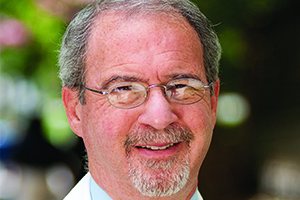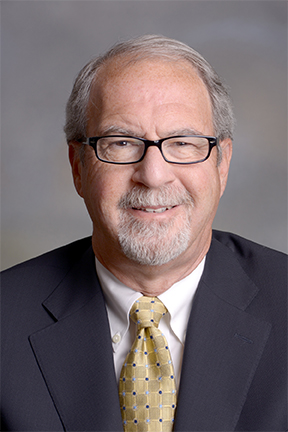 Before his days spent at medical school at Duke University, Lanning Kline, M.D., spent his youth in Alberta, Canada, excelled at his studies, and enjoyed playing sports such as ice hockey. His father was the proprietor of a successful jewelry store who would enlist his son’s help during busy holidays.
Before his days spent at medical school at Duke University, Lanning Kline, M.D., spent his youth in Alberta, Canada, excelled at his studies, and enjoyed playing sports such as ice hockey. His father was the proprietor of a successful jewelry store who would enlist his son’s help during busy holidays.
“What I learned from my father was that business is all about relationships,” he says, “and what I learned from my mother was that I wasn’t going into the jewelry business.”
Instead, Kline knew from an early age he was interested in either law or medicine, and applied to both schools at the same time. A close family friend, who happened to be a cardiologist, provided Kline the insights into the field of medicine. His uncle, who was an optometrist in Edmonton, urged him to consider pursuing a similar career.
Still, he remained undecided between the two professions, and even applied to both medical and law schools during his senior year at the University of Alberta, where he majored in political science with a minor in economics. He also took pre-med courses in order to be prepared should he ultimately choose that course of action.
“I thought about staying in Canada, but for some reason I was really drawn to the idea of studying in the United States. I always thought I would end up returning to Canada, but I felt like it was time to get out into the world and see what I could make of myself." Eventually, he decided to take the MCAT instead of the LSAT.
Kline attended Duke University Medical School in 1969, and knew early on his chosen field would be ophthalmology. As he went through the clinical electives, neurology sparked his interest, but nothing held his attention like ophthalmology. This is when he decided that neuro-ophthalmology would be his sub-specialty. He was accepted into the residency program at the Royal Victoria Hospital at McGill University in Montreal, where he also completed a fellowship in neuro-ophthalmology. “Spending those winters in Montreal was all the reminder I needed to remember how much I hated the cold,” Kline says, “so I looked for additional training somewhere warmer.”
That ended up being Miami, Florida, where he completed another one-year fellowship at the Bascom Palmer Eye Institute under supervision of renowned neuro-ophthalmologist J.S. Glaser, M.D. He had also become a legal U.S. resident in 1977, so the idea of practicing in the United states was becoming more likely. So, he began seeking open positions in neuro-ophthalmology around the country.
 “When I found out there was an open position at UAB, I knew nothing about Birmingham,” Kline says. “I saw some beautiful photos of Birmingham and shared them with my wife, Ricki, because she had 50 percent of the vote. The photos were beautiful, and she said ‘maybe we should look into this,’ so we did.”
“When I found out there was an open position at UAB, I knew nothing about Birmingham,” Kline says. “I saw some beautiful photos of Birmingham and shared them with my wife, Ricki, because she had 50 percent of the vote. The photos were beautiful, and she said ‘maybe we should look into this,’ so we did.”
They were so impressed by the city and the university, and felt so welcomed by the department’s (then) small faculty and the surrounding community, that they began to see relocating to Birmingham as a real possibility. “Dr. Pfister was chair of the department at the time, and of course Dr. Alston Callahan was quite charismatic and persuasive, so when they offered me the position Ricki and I decided to take them up on it. We thought we would stay five years or so, but that was nearly 40 years ago.”
Joining UAB Ophthalmology
Kline joined the department as assistant professor of ophthalmology, neurology, and neurosurgery in 1979. He was the fourth full-time faculty member, and he immediately began building his practice by visiting other physicians on campus, around the city, and across Alabama.
However, as time passed, the department failed to meet his growth expectations, and as a young ophthalmologist with a great deal of drive, he began to feel restless. He and Ricki had become deeply embedded in the local community, and weren’t as eager to move as they had once expected to be. That’s when Kline was approached by pediatric ophthalmologist, Frederick Elsas, M.D., and cornea specialist Robert Phillips, M.D., who asked if he’d be interested in joining their private practice, Alabama Ophthalmology Associates, which was then located in the Children’s Hospital professional building, just one block away from Callahan Eye Hospital. So, Kline was able to continue making rounds and teaching residents.
In the late nineties, Harold Skalka, M.D., decided to step down as the department’s chair after nearly two decades of service. Kline was asked to join the search committee. Candidates were interviewed, and one was offered the position but declined. At some point Kline’s fellow committee members realized they needed someone with an insider’s understanding of the department and the university, and asked if he would be interested.
“I was honored, of course, but it was also a big decision,” he says. “I made a very careful review of the department’s structure, potential, and its finances, and I just couldn’t see how it would work.”
It was during this time when the board of the Callahan Eye Hospital made the decision to sell to UAB, which led to the founding of the EyeSight Foundation of Alabama (ESFA). Along with the late William Deal, M.D.—who was then dean of the School of Medicine—Kline met with Jim Davis, the new board’s founding chair, to discuss the path ahead. “It was his description of the foundation’s mission of research, education, and indigent care in the state that convinced me that the support the department needed was there,” Kline says, “so I agreed to fill the position on an interim basis.”
Some months later Deal asked if he was ready to solidify the position, but Kline still had reservations, so he made a counter offer. “I said the only way I could see it working was if the position of chair were endowed, so that the department’s resources could be utilized elsewhere,” he says. “I told them that if the EyeSight Foundation would create this endowed chair for the position that I would accept, which they agreed to do so. So, in all honesty, it wasn’t for the Eyesight Foundation of Alabama I never would have become chair of the department.
Transition After Stepping Down as Chair
Kline handed over the reins of chair to Christopher Girkin, M.D., in 2012. He remains on the faculty, continuing to see patients and teach residents, which allows him to continue to play a role in the department’s continued growth and evolution. “When you look at the department now, and then take a look at it back in 1997, it’s not even the same department.”
Kline and his wife, Ricki, celebrated their 40th wedding anniversary in April of this year. He has two children, and one grandson. His son Aaron and his wife live in San Diego with their three-year old son, Andrew. His daughter Evelyn, named after Kline’s late mother, was recently married in July 2017 in Seattle. Kline still dedicates his spare time to medicine and serves as editor of Journal of Neuro-Ophthalmology. When he isn’t working, Kline and his wife enjoy traveling to see their children and visiting countries around the world. One of their favorite travel destinations: Israel.
Leaving a Legacy
“My wife is a fundraiser in the general community, and is involved in the YWCA and The Women’s Fund. Over the years, she has taught me I cannot ask my colleagues to give to the department unless I have given, and I am proud to say that I have,” says Kline.
Working in the Department of Ophthalmology for over 35 years, Kline feels very invested in its future. “The department gave me a tremendous opportunity in my career, so I should continue to support the department.”
To Kline, the department gave him and countless alumni the opportunity to go out into the country and be successful. “It is a logical step that if the department and hospital gave you a lot, you should continue to support the department.”
If you would like to learn more about planned giving, or giving back to the Department of Ophthalmology, please contact Morgan Quarles at nmrobinson@uabmc.edu or 205.325.8112.